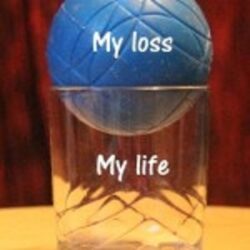When our child dies, our lives simply cannot contain the loss. We asked some of our befrienders to tell us how, over time, they have been able to incorporate it within their ‘new normal’ lives.
Whenever we run events for bereaved parents we use a helpful visual demonstration of what it means to start accommodating the catastrophic event of our child’s death into our lives.

The ball in the picture represents our loss; the glass, our life – our loss is simply too great for our lives to contain it. As time goes by, the fact that we are surviving and ultimately living meaningful lives again, is not because we have forgotten our child or that their loss has become less significant to us. What has happened is that our capacity to cope with that devastation has increased. In time, our lives grow, to be able to contain our loss as well as other things which have significance and meaning, and even provide enjoyment. This isn’t a process that happens overnight – or even in the first few months following the death of our son or daughter. It is, perhaps, the journey of the rest of our lives.

We asked our Bereaved Parent Support befrienders to tell us how this growth in capacity for living has taken place in their lives.
Philippa told us:
Somehow, every day you choose to struggle out of bed to do what you need. And you do it, but you are left weary and drained, wanting only to hide back under your bedcovers. Your ability to bear the unbearable grows, albeit imperceptibly. You do it again and again until a month and another has passed and then a season. The world keeps turning and, inexorably, the anniversary arrives. You don’t want it, but it comes. You pull yourself through it, and your capacity for living grows a little more; though you didn’t set out to increase it, it has done so. Life might not feel easier yet, but you are doing more than you could before, even, eventually, beginning to plan for a future.
Many of our befrienders reminded us of the need to take small steps. Set small goals for yourself, such as a short walk or coffee with a friend. It’s also helpful to break a task down – for example, buying only one or two things the first time you shop.
If friends offer help, try to allow them into your life. Hopefully, you will find a few people you can trust and can be yourself with.
The opportunity to be with others who are carrying grief was also valued by our befrienders, who said that talking to people who have experienced a similar loss encouraged and helped them realise it was possible for them to survive too.
Learning to communicate with their partner again was really important to Nich and Di:
The technique of reflecting back to each other what the other had said helped us to promote fuller understanding. We also established a date night, which we still have. Even if we had nothing to say, as in the early days, we could just sit and hold hands.
Sandra felt relief, then guilt, when she realised she was able to get absorbed in something for a few hours without thinking about her daughter Louise:
The realisation that this was good, and that I wasn’t as exhausted as normal, meant that I was able to repeat it. Often guilt or feeling disloyal prevents parents from being able to include other things in their lives. Giving yourself permission to do that is important. The first time we tried to go out for a meal we ended up coming home, not being able to go into the restaurant. Meals out had always been to celebrate something. Taking someone else along to social or other occasions can also help as they can do the talking or be the focus. The tradition in work was to bring your baby to see everyone before you went back after maternity leave. I wanted to see my colleagues but was terrified of what we would talk about. So I took my two-year-old nephew with me and everyone focused on him. Not only did it make it easier for me, but it was easier for my colleagues too.'
In time, make space to do things that you enjoy. It could be an old hobby or interest, or you may feel able to try something new. Perhaps plan a small trip or holiday, and try to have something to look forward to. Or start a project such as de-cluttering your attic, however, don’t expect to be able to take on bigger challenges like this overnight.
Ian and Janet did take on a bigger challenge and travelled to New Zealand for sixteen months:
It gave us opportunity to meet new people all the time, enabling us to tell our story over and over again without boring people. Some might say we were distracting ourselves, but I think it gave us time and space to evaluate where we were and to gradually restructure our lives without Peter. We always see this period as our ‘Healing time'.
Sarah told us:
You know your ability to cope with life is growing when you can stand being around other parents with their children who may be of similar age to the child you lost.
Over time your life will be fuller, not because you have squeezed out the memory or the loss of your child, but because your capacity has grown sufficiently to be able to carry that as well as incorporate other things, other people and other challenges which will enrich your life. You will find yourself achieving things you would never have thought possible.
Share on social media
Help us support families today
At Care for the Family we support couples, parents and those who have been bereaved. If you would be able to make a one off donation to support our work, we would be very grateful. Thank you.
